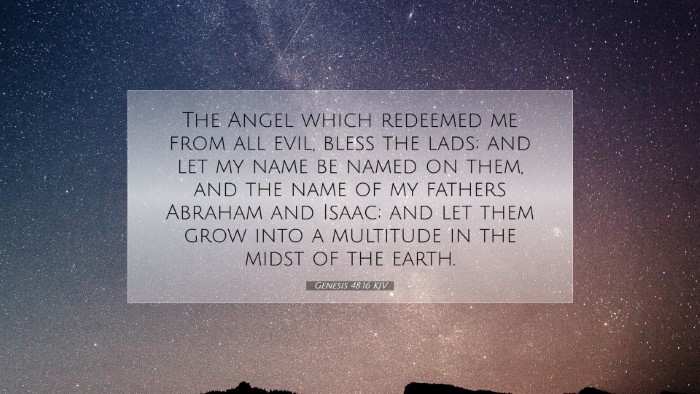Commentary on Genesis 48:16
Verse: "The angel which redeemed me from all evil, bless the lads; and let my name be named on them, and the name of my fathers Abraham and Isaac; and let them grow into a multitude in the midst of the earth."
Introduction
This verse encapsulates a profound moment in Jacob's life as he blesses the sons of Joseph—Ephraim and Manasseh. It serves not only as a personal blessing but also as a theological statement regarding God's faithfulness, heritage, and the hope for future generations.
Theological Insights
- The Role of the Angel: Jacob refers to the angel that redeemed him from all evil, which can be interpreted as a manifestation of God's providence throughout his life. Matthew Henry notes that this 'angel' symbolizes the divine presence that guided and protected Jacob during his trials.
- Redemption and Protection: The notion of being redeemed from evil signifies not only deliverance from personal threats but also a broader understanding of God's sustaining grace. Albert Barnes emphasizes that this is a recognition of God's intervention in Jacob’s life, which he attributes to divine favor.
- Legacy of Faith: Jacob's request for his name and the names of Abraham and Isaac to be associated with his grandsons highlights the importance of lineage and faith heritage. Adam Clarke notes that this plea expresses Jacob’s desire for the promises made to the patriarchs to extend to the next generation.
Historical Context
Understanding the historical background of the patriarchal blessings enhances the depth of this verse. Jacob blesses Ephraim and Manasseh in Egypt, at a time when they were residing in a foreign land. This act signifies the continuation of God’s covenant people, illustrating that God's blessings were not confined to the Promised Land but expansive.
Hermeneutical Reflections
Interpreting this verse requires grappling with themes of blessing, identity, and divine promise. Jacob’s invocation of his past troubles alongside God’s redemptive power invites readers to reflect on the transformative nature of divine encounters.
- Identity in the Blessing: The act of naming Ephraim and Manasseh with regard to Jacob's name establishes their identity as part of God's covenant community. This is a powerful reminder to Christians today of how we are grafted into the lineage of faith through Christ.
- Prayer and Intercession: Jacob’s statement functions as a prayer for his descendants, showcasing the importance of intercession for future generations. This encourages believers to extend their spiritual legacy through prayer and blessing.
Practical Applications for Contemporary Readers
This scripture offers several practical applications for pastors, students, theologians, and Bible scholars:
- Emphasis on Family Heritage: Recognizing the importance of spiritual heritage encourages families to cultivate faith within their homes and pass down the values of God's promises to future generations.
- Encouragement in Trials: Just as Jacob reflects on God’s past deliverance, believers are urged to remember God's faithfulness during their own challenges, sustaining hope for future blessings.
- Engagement in Blessing Others: The act of seeking God's blessing for others serves as a call to actively bless those around us, contributing to a culture of faith and encouragement within the church community.
Conclusion
Genesis 48:16 is rich in meaning and implications for faith life today. Jacob's recognition of God's redemptive power paired with the desire to bless his grandsons illustrates a pivotal moment that resonates with the themes of legacy, identity, and divine providence. Through this verse, believers are reminded of the importance of both remembering God's faithfulness and passing on that faith to future generations.


